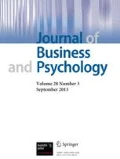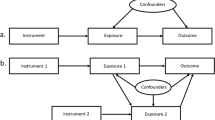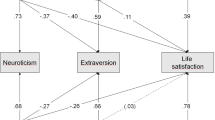Abstract
Purpose
The purpose of this study was to investigate the degree to which genetic and environmental influences explain differences in job satisfaction and its relationship to personality in order to explain the heritability of job satisfaction.
Design
Behavior genetic analyses are based on a dataset containing 622 individuals, including 185 MZ (M = 39.5 years) and 126 DZ twin pairs (M = 40.1 years).
Findings
The results showed that all genetic influences (28 %) on job satisfaction could be explained by its relation to personality, especially Neuroticism, Extraversion, and Conscientiousness, representing a high genetic overlap between job satisfaction and personality. Non-shared environmental influences explained the remaining three fourths of the variance.
Implications
By showing that genetic influences of job satisfaction overlap completely with personality, including common non-additive genetic influences, the results support an interactionist view of job satisfaction in that both situational and dispositional determinants of job satisfaction are relevant.
Originality
In contrast to previous studies, we used a more appropriate behavior genetic approach meaning that our approach allows to directly estimate parameters of specific and common (additive and non-additive) genetic and environmental influences. Building on this, interpretations of behavior genetic findings were explained in detail to avoid common misunderstandings.



Similar content being viewed by others
Notes
Ilies and Judge (2003) used the following formula to compute the partial heritability (\(h_{\text{p}}^{2}\)) for job satisfaction mediated by the Big Five (\(h_{\text{p}}^{2} = \sum {(h_{\text{i}} \beta_{\text{i}} )^{2} }\)). First, this means that the values for \(\beta_{\text{i}}\) were assumed to affect genetic and environmental variance to the same extent. But it could also be the case that \(\beta_{\text{i}}\) involves only genetic or environmental influences or both to different degrees. Second, they summarized the effect of each personality trait based on the assumption of orthogonal factors. With regard to job satisfaction, it could also be the case that the variance components explained by the personality traits were not completely independent.
TNS Infratest is a German institute for market and opinion research. Homepage at http://www.tns-infratest.com/.
SOEP questionnaires are available online at http://panel.gsoep.de/soepinfo2011/.
As the personality traits were not independent, we also modeled all possible intercorrelations between the Big Five personality traits in the regression model.
References
Arbuckle, J. L. (2006). Amos 7.0 User’s Guide. Chicago, IL: SPSS.
Arvey, R. D., Bouchard, T. J., Segal, N. L., & Abraham, L. M. (1989). Job satisfaction: Environmental and genetic components. Journal of Applied Psychology, 74, 187–192. doi:10.1037/0021-9010.74.2.187.
Arvey, R. D., McCall, B. P., Bouchard, T. J., Taubman, P., & Cavanaugh, M. A. (1994). Genetic influences on job satisfaction and work value. Personality and Individual Differences, 17, 21–33. doi:10.1016/0191-8869(94)90258-5.
Bartels, M., & Boomsma, D. I. (2009). Born to be happy? The etiology of subjective well-being. Behavior Genetics, 39(6), 605–615. doi:10.1007/s10519-009-9294-8.
Becker, A., Busjahn, A., Faulhaber, H., Bähring, S., Robertson, J., Schuster, H., & Luft, F. (1997). Twin zygosity: Automated determination with microsatellites. Journal of Reproductive Medicine, 42, 260–266.
Böckerman, P., & Ilmakunnas, P. (2008). Interaction of working conditions, job satisfaction, and sickness absences: Evidence from a representative sample of employees. Social Science and Medicine, 67, 520–528. doi:10.1016/j.socscimed.2008.04.008.
Bollen, K. A. (1989). Structural equations with latent variables. Oxford, UK: Wiley.
Bouchard, T. J. (2004). Genetic influences on human psychological traits. Current Directions in Psychological Science, 13, 148–151. doi:10.1111/j.0963-7214.2004.00295.x.
Bouchard, T. J., & Loehlin, J. C. (2001). Genes, evolution, and personality. Behavior Genetics, 31, 243–273.
Browne, M. W., & Cudeck, R. (1992). Alternative ways of assessing model fit. Sociological Methods & Research, 21, 230–258. doi:10.1177/0049124192021002005.
Caspi, A., McClay, J., Moffitt, T. E., Mill, J., Martin, J., Craig, I. W., … Poulton, R. (2002). Role of genotype in the cycle of violence in maltreated children. Science, 297, 851–854. doi:10.1126/science.1072290.
Costa, P. T., & McCrae, R. R. (1992a). Revised NEO personality inventory (NEO-PI-R) and NEO five-factor inventory (NEO-FFI) professional manual. Odessa, FL: Psychological Assessment Resources.
Costa, P. T., & McCrae, R. R. (1992b). Four ways five factors are basic. Personality and Individual Differences, 13, 653–665. doi:10.1016/0191-8869(92)90236-I.
Coventry, W. L., & Keller, M. C. (2005). Estimating the extent of parameter bias in the classical twin design: A comparison of parameter estimates from extended twin-family and classical twin designs. Twin Research and Human Genetics, 8, 214–223. doi:10.1375/1832427054253121.
Dehne, M., & Schupp, J. (2007). Persönlichkeitsmerkmale im Sozio-oekonomischen Panel (SOEP)—Konzept, Umsetzung und empirische Eigenschaften. Berlin, Germany: DIW.
Dormann, C., & Zapf, D. (2001). Job satisfaction: A meta-analysis of stabilities. Journal of Organizational Behavior, 22, 483–504. doi:10.1002/job.98.
Eaves, L. J., Eysenck, H. J., & Martin, N. G. (1989). Genes, culture and personality: An empirical approach. London, UK: Academic Press.
Eaves, L. J., Heath, A., Martin, N., Maes, H., Neale, M., Kendler, K., … Corey, L. (1999). Comparing the biological and cultural inheritance of personality and social attitudes in the Virginia 30 000 study of twins and their relatives. Twin Research and Human Genetics, 2, 62–80. doi:10.1375/twin.2.2.62.
Emmons, R. A., Diener, E., & Larsen, R. J. (1985). Choice of situations and congruence models of interactionism. Personality and Individual Differences, 6, 693–702. doi:10.1016/0191-8869(85)90080-7.
Fahrenberg, J., Myrtek, M., Schumacher, J., & Brähler, E. (2000). Fragebogen zur Lebenszufriedenheit (FLZ). Handanweisung, Göttingen: Hogrefe.
Fiedler, F. E. (1967). Style of leadership and performance of coacting groups. Zeitschrift für Experimentelle und Angewandte Psychologie, 14, 200–217.
Fryers, T. (2006). Work, identity and health. Clinical Practice and Epidemiology in Mental Health, 2, 12. doi:10.1186/1745-0179-2-12.
Furnham, A., Petrides, K. V., Jackson, C. J., & Cotter, T. (2002). Do personality factors predict job satisfaction? Personality and Individual Differences, 33, 1325–1342. doi:10.1016/S0191-8869(02)00016-8.
Gerlitz, J.-Y., & Schupp, J. (2005). Zur Erhebung der Big-Five-basierten Persönlichkeitsmerkmale im SOEP: Dokumentation der Instrumentenentwicklung BFI-S auf Basis des SOEP-Pretests [Assessment of big five personality characteristics in the SOEP: Documentation of the development of the instrument BFI-S on the basis of the SOEP pretests]. Berlin, Germany: DIW.
Hackman, J. R., & Oldham, G. R. (1976). Motivation through the design of work: Test of a theory. Organizational Behavior and Human Performance, 16, 250–279. doi:10.1016/0030-5073(76)90016-7.
Hahn, E., Gottschling, J., & Spinath, F. M. (2012a). Short measurements of personality—Validity and reliability of the GSOEP Big Five Inventory (BFI-S). Journal of Research in Personality, 46, 355–359. doi:10.1016/j.jrp.2012.03.008.
Hahn, E., Johnson, W., & Spinath, F. M. (2013). Beyond the heritability of life satisfaction: The roles of personality and twin-specific influences. Journal of Research in Personality, 47, 757–767. doi:10.1016/j.jrp.2013.07.003.
Hahn, E., Spinath, F. M., Siedler, T., Wagner, G. G., Schupp, J., & Kandler, C. (2012b). The complexity of personality: Advantages of a genetically sensitive multi-group design. Behavior Genetics, 42, 221–233. doi:10.1007/s10519-011-9493-y.
Herzberg, F., Mausner, B., & Snyderman, B. (1959). The motivation to work (2nd ed.). Oxford, UK: Wiley.
Ilies, R., & Judge, T. A. (2003). On the heritability of job satisfaction: The mediating role of personality. Journal of Applied Psychology, 88, 750–759. doi:10.1037/0021-9010.88.4.750.
James, L. A., & James, L. R. (1989). Integrating work environment perceptions: Explorations into the measurement of meaning. Journal of Applied Psychology, 74, 739–751. doi:10.1037/0021-9010.74.5.739.
Johnson, W., & Krueger, R. F. (2006). How money buys happiness: Genetic and environmental processes linking finances and life satisfaction. Journal of Personality and Social Psychology, 90, 680–691. doi:10.1037/0022-3514.90.4.680.
Johnson, W., Krueger, R. F., Bouchard, T. J., & McGue, M. (2002). The personalities of twins: Just ordinary folks. Twin Research, 5, 125–131. doi:10.1375/1369052022992.
Johnson, W., Penke, L., & Spinath, F. M. (2011). Heritability in the era of molecular genetics: Some thoughts for understanding genetic influences on behavioural traits. European Journal of Personality, 25, 254–266. doi:10.1002/per.836.
Johnson, W., Turkheimer, E., Gottesman, I. I., & Bouchard, T. J. (2009). Beyond heritability: Twin studies in behavioral research. Current Directions in Psychological Science, 18, 217–220. doi:10.1111/j.1467-8721.2009.01639.x.
Johnson, A. M., Vernon, P. A., & Feiler, A. R. (2008). Behavioral genetic studies of personality: An introduction and review of the results of 50+ years of research. In G. J. Boyle, G. Matthews, & D. H. Saklowske (Eds.), The SAGE handbook of personality theory and assessment. Personality theories and models (Vol. 1, pp. 145–173). London, UK: SAGE.
Judge, T. A., Bono, J. E., Ilies, R., & Gerhardt, M. W. (2002a). Personality and leadership: A qualitative and quantitative review. Journal of Applied Psychology, 87, 765–780. doi:10.1037/0021-9010.87.4.765.
Judge, T. A., & Church, A. H. (2000). Job satisfaction: Research and practice. In C. L. Cooper & E. A. Locke (Eds.), Industrial and organizational psychology: Linking theory with practice (pp. 166–198). Oxford, UK: Blackwell.
Judge, T. A., Heller, D., & Mount, M. K. (2002b). Five-factor model of personality and job satisfaction: A meta-analysis. Journal of Applied Psychology, 87, 530–541. doi:10.1037/0021-9010.87.3.530.
Judge, T. A., & Klinger, R. (2008). Job satisfaction: Subjective well-being at work. In M. Eid & R. J. Larsen (Eds.), The science of subjective well-being (pp. 393–413). New York, NY: Guilford Press.
Judge, T. A., Piccolo, R. F., Podsakoff, N. P., Shaw, J. C., & Rich, B. L. (2010). The relationship between pay and job satisfaction: A meta-analysis of the literature. Journal of Vocational Behavior, 77, 157–167. doi:10.1016/j.jvb.2010.04.002.
Judge, T. A., & Watanabe, S. (1994). Individual differences in the nature of the relationship between job and life satisfaction. Journal of Occupational and Organizational Psychology, 67, 101–107. doi:10.1111/j.2044-8325.1994.tb00554.x.
Kandler, C., Riemann, R., & Kämpfe, N. (2009). Genetic and environmental mediation between measures of personality and family environment in twins reared together. Behavior Genetics, 39, 24–35. doi:10.1007/s10519-008-9238-8.
Kandler, C., Riemann, R., Spinath, F. M., & Angleitner, A. (2010). Sources of variance in personality facets: A multiple-rater twin study of self-peer, peer-peer, and self-self (dis)agreement. Journal of Personality, 78, 1565–1594. doi:10.1111/j.1467-6494.2010.00661.x.
Keller, M., Coventry, W., Heath, A., & Martin, N. (2005). Widespread evidence for non-additive genetic variation in Cloninger’s and Eysenck’s personality dimensions using a twin plus sibling design. Behavior Genetics, 35, 707–721. doi:10.1007/s10519-005-6041-7.
Little, R. J. A., & Rubin, D. B. (2002). Statistical analysis with missing data. Hoboken, NJ: Wiley.
Locke, E. A. (1976). The nature and causes of job satisfaction. In M. D. Dunnette (Ed.), Handbook of industrial and organizational psychology (pp. 1297–1349). Chicago, IL: Rand McNally.
Loehlin, J. C. (1992). Genes and environment in personality development. Thousand Oaks, CA: Sage.
Loehlin, J. C. (1996). The Cholesky approach: A cautionary note. Behavior Genetics, 26, 65–69. doi:10.1007/BF02361160.
Loehlin, J. C., McCrae, R. R., Costa, P. T., & John, O. P. (1998). Heritabilities of common and measure-specific components of the Big Five personality factors. Journal of Research in Personality, 32, 431–453. doi:10.1006/jrpe.1998.2225.
McGue, M., & Bouchard, T. J. (1984). Adjustment of twin data for the effects of age and sex. Behavior Genetics, 14, 325–343. doi:10.1007/BF01080045.
Neale, M. C., & Maes, H. H. (2004). Methodology for genetic studies of twins and families. Dordrecht, Netherlands: Kluwer Academics.
Oniszczenko, W., Angleitner, A., Strelau, J., & Angert, T. (1993). The questionnaire of twins` physical resemblance. Unpublished report, Department of Psychology, University of Warsaw, Poland.
Organ, D. W., & Lingl, A. (1995). Personality, satisfaction, and organizational citizenship behavior. The Journal of Social Psychology, 135, 339–350. doi:10.1080/00224545.1995.9713963.
Ostendorf, F., & Angleitner, A. (2004). NEO-PI-R: NEO-Persönlichkeitsinventar nach Costa und McCrae, revidierte Fassung [The NEO personality inventory after Costa and McCrae: Revised version]. Göttingen, Germany: Hogrefe.
Ozaki, K., Toyoda, H., Iwama, N., Kubo, S., & Ando, J. (2011). Using non-normal SEM to resolve the ACDE model in the classical twin design. Behavior Genetics, 41, 329–339. doi:10.1007/s10519-010-9386-5.
Plomin, R., DeFries, J. C., Knopik, V. S., & Neiderhiser, J. M. (2012). Behavioral genetics (6th ed.). New York, NY: Worth Publishers.
Plomin, R., DeFries, J. C., McClearn, G. E., & McGuffin, P. (2008). Behavioral genetics (5th ed.). New York, NY: Worth Publishers.
Riemann, R., & Kandler, C. (2010). Construct validation using multitrait-multimethod-twin data: The case of a general factor of personality. European Journal of Personality, 24, 258–277. doi:10.1002/per.760.
Schneider, B., & Snyder, R. A. (1975). Some relationships between job satisfaction and organization climate. Journal of Applied Psychology, 60, 318–328. doi:10.1037/h0076756.
Song, Z., Li, W., & Arvey, R. D. (2011). Associations between dopamine and serotonin genes and job satisfaction: Preliminary evidence from the Add Health Study. Journal of Applied Psychology, 96, 1223–1233. doi:10.1037/a0024577.
Spinath, F. M., Angleitner, A., Borkenau, P., Riemann, R., & Wolf, H. (2002). German observational study of adult twins (GOSAT): A multimodal investigation of personality, temperament and cognitive ability. Twin Research, 5, 372–375. doi:10.1375/136905202320906110.
Spinath, F. M., & Wolf, H. (2006). CoSMoS and TwinPaW: Initial report on two new German twin studies. Twin Research and Human Genetics, 9, 787–790. doi:10.1375/183242706779462903.
Staw, B. M., Bell, N. E., & Clausen, J. A. (1986). The dispositional approach to job attitudes: A lifetime longitudinal test. Administrative Science Quarterly, 31, 56–77. doi:10.2307/2392766.
Staw, B. M., & Ross, J. (1985). Stability in the midst of change: A dispositional approach to job attitudes. Journal of Applied Psychology, 70, 469–480. doi:10.1037/0021-9010.70.3.469.
Steel, P., Schmidt, J., & Shultz, J. (2008). Refining the relationship between personality and subjective well-being. Psychological Bulletin, 134, 138–161. doi:10.1037/0033-2909.134.1.138.
Stößel, K., Kämpfe, N., & Riemann, R. (2006). The Jena twin registry and the Jena twin study of social attitudes (JeTSSA). Twin Research and Human Genetics, 9, 783–786. doi:10.1375/183242706779462615.
Turkheimer, E. (2000). Three laws of behavior genetics and what they mean. Current Directions in Psychological Science, 9, 160–164. doi:10.1111/1467-8721.00084.
Viswesvaran, C., & Ones, D. S. (2000). Measurement error in “Big Five factors” personality assessment: Reliability generalization across studies and measures. Educational and Psychological Measurement, 60, 224–235. doi:10.1177/00131640021970475.
Weiss, A., Bates, T. C., & Luciano, M. (2008). Happiness is a personal(ity) thing: The genetics of personality and well-being in a representative sample. Psychological Science, 19, 205–210. doi:10.1111/j.1467-9280.2008.02068.x.
Weitz, J. (1952). A neglected concept in the study of job satisfaction. Personnel Psychology, 5, 201–205. doi:10.1111/j.1744-6570.1952.tb01012.
Author information
Authors and Affiliations
Corresponding author
Appendix
Appendix
In order to compare the methodology of the presents study to those performed in the Ilies and Judge (2003) study, we directly transferred our Cholesky decomposition model into their formula: (\(h_{\text{p}}^{2} = \sum {(h_{\text{i}} \beta_{\text{i}} )^{2} }\)). We used β i-values from our latent path regression model and heritability estimates (h i) from our latent behavior genetic model. If we use the Ilies and Judge’s formula, we find a partial heritability of job satisfaction of about 11.7 %, which would imply that 42 % of the total heritability of job satisfaction (\(h_{\text{total}}^{2} = 28\%\)) would seem to be mediated by common genetic effects with personality. As can be seen by the direct comparison of the results, the partial heritability of job satisfaction controlled for the personality traits would be underestimated when the formula of Ilies and Judge (2003) is used.
Rights and permissions
About this article
Cite this article
Hahn, E., Gottschling, J., König, C.J. et al. The Heritability of Job Satisfaction Reconsidered: Only Unique Environmental Influences Beyond Personality. J Bus Psychol 31, 217–231 (2016). https://doi.org/10.1007/s10869-015-9413-x
Published:
Issue Date:
DOI: https://doi.org/10.1007/s10869-015-9413-x




